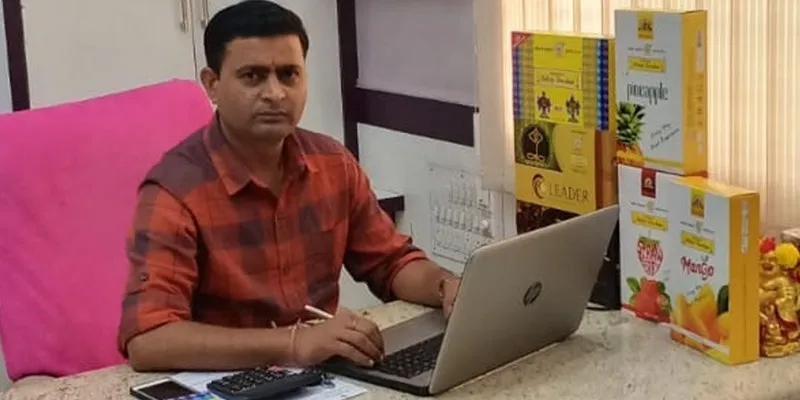Clocking Rs 20 Cr turnover, this entrepreneur from small-town Jalore found success in Bengaluru with his agarbatti brand
Chamundi Agarbathi is a Bengaluru-based brand that was started in 2010 in a 1,200 sq ft space. The company now exports its agarbathis to various countries, recording an annual turnover of Rs 20 crore.

Kantilal Parmar, Founder, Chamundi Agarbatti
Small town people dream big with open eyes. Kantilal Parmar also had big dreams when his brother moved from Jalore, Rajasthan, to Bengaluru, Karnataka, to work with their father’s friend in an agarbatti trading firm.
"My elder brother moved to Bengaluru with my uncle (father’s friend) to start working. I was studying at that time in Jalore. After completing my schooling I also came down to help him. Though we were working, we had dreams of doing something big at some time,” Kantilal Parmar, 40, tells SMBStory.
The beginning
Kantilal says his brother initially had rotogravure printing work, where he used to print packages for various agarbatti manufacturers. Later, in 2003, both the brothers branched out by trading in the raw materials used for agarbatti manufacturing.
"We used to trade raw materials like perfume, packaging material, and more used for manufacturing agarbatti. We continued the same work for around seven years after which we decided to open our own manufacturing unit and scale up rather than just continue trading.”
In 2009, deploying capital from personal savings and taking a loan against property, Kantilal started an agarbatti manufacturing unit in a 1,200 sqft space with around Rs 15 lakh.
He says that an agarbatti manufacturing unit can be small enough to start at home with a meagre capital. However, that restricts scaling up and customisations, which needs more capital.
The company had a small beginning with 15 employees.

Chamundi agarbatti
Kantilal says, “Though we had connections in the market, we had a tough time getting orders initially. We struggled for the entire first year after which we started receiving a good response.”
Slow and steady growth
Gradually, the company started growing and by 2012, it had grown to a 320-distributor network. Seeing the tremendous market response, Kantilal then decided to take a bold step and set up another manufacturing unit in an 8,000 sqft space.
He says, “It was becoming difficult to supply orders from the old unit. There was not even enough space to put raw materials. As we were growing, we thought to expand and disrupt the industry.”
The company slowly grew, employing 50 workers and 20 sales representatives to market its products.
Kantilal registered Chamundi Agarbatti under the MSME scheme in 2012 and within three years of inception, the brand became one of the top manufacturers of agarbatti. Today, it clocks an annual turnover of Rs 20 crore.
The brand sources raw materials like wood powder from Ahmedabad. It also imports materials like joss powder and bamboo from Vietnam and China respectively. Other raw materials are sourced from Jaipur, Mumbai, and other places.
At present, the company has a presence in almost all the major markets of India, including Uttar Pradesh, Bihar, West Bengal, Karnataka, Andhra Pradesh, and Kerala, through distributors and small retailers. It now has workforce of around 70 workers and a sales force of around 50 members.

Chamundi agarbatti's dhoops collection
The brand also exports to international markets in Malaysia, Mauritius, and Sri Lanka through agents without branding. From agarbatti the company diversified into various categories such as dhoops, incense cones, cup dhoops, masala agarbatti, floral incense, and more.
Challenges and the competition
Kantilal says that one of the biggest challenges in the industry is credit lending of stock.
“In the beginning, it was very difficult to lend on credit for long term. However, when we scaled up we started to give on credit for a specified time period like for seven days, 15 days, or 21 days, providing the distributors offers on payments.”
As of now, the organised Indian agarbatti industry is pegged at Rs 3,000 crore.
Kantilal claims that the brand differentiates from its competitors by efficiently marketing products and by providing the best quality at the most reasonable price.
Plans for the future
Kantilal continues to dream big. He says they are at present dealing through distributors and in the future wish to enter the retail segment through shelf space at Big Bazaar, DMart, Reliance, and more.
He also reveals that they are in the process of opening another office space at Jalore, their home town, to market the brand in the region and beyond.








